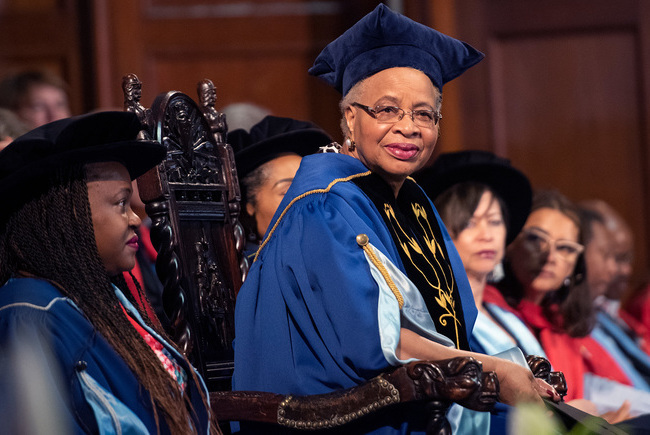UCT Libraries, Campus safety and Student Wellness
21 September 2020 Read time 5 min.
UCT Libraries
A budget of R157.2 million enabled continued access to print and electronic resources and technologies, the provision and maintenance of scholarly services and facilities by skilled staff, and the exploration of new services for excellent user experiences.
Researchers were supported by various UCT Libraries units, including Access Services, Discovery Services, Faculty Liaison, Open Scholarship, Research Data Management and Digital Library Services.
In its role as publisher, UCT Libraries successfully published its 13th open monograph, Biomedical Engineering for Africa and the Conference Proceedings of Adaptation Futures 2018.
Traces of the Ottoman Empire, a new area of collection development that traces the Ottoman influence on the Muslim community in Cape Town, was launched on 22 October.
The UCT-SPARC AFRICA Open Access Symposium, a collaborative symposium themed “Open Access and social justice driving African development”, was hosted from 2 to 6 December in Cape Town.
The UCT GIS Unit was formally established within UCT Libraries to offer technical and academic support for geographic information system (GIS) at UCT, as well as linking GIS to librarianship and library collections.
The acquisition of the Zeutschel ScanStudio, a first in Africa, will enable UCT Libraries to contribute to the digital preservation of heritage collections according to international standards.
UCT Libraries completed renovations in the Brand van Zyl Law Library, repurposed the Research Commons to offer a more conducive space, and commenced the development of a 10-year master spatial and design plan.

Keeping campus safe
UCT is an open campus, and several university properties, including student residences, are in neighbouring residential areas. 2019 saw an increase in the overall number of crimes reported to Campus Protection Services (CPS) across all campuses, as well as in the surrounding areas of Rondebosch, Mowbray and Observatory. Crimes of concern reported for the year were theft of, and from motor vehicles.
To address these issues, CPS, in collaboration with its partners – the Groote Schuur Community Improvement District and the South African Police Service, installed licence plate recognition cameras in strategic areas on the fringes and on campus. This has proven to be successful as several perpetrators were arrested either on campus or in the immediate vicinity, after CPS was alerted by the new system.
CPS started its closed-circuit television (CCTV) renewal project early in 2019, which showed immediate results in several areas across campus. With the new CCTV installation, CPS managed to identify groups operating in common areas where students’ belongings had been stolen. Subsequent operations were planned, and the team managed to effect successful arrests in several instances.
In 2019 CPS started the process of procuring new security vehicles, which will be deployed in strategic areas on upper, middle and lower campuses. This will allow CPS to reduce the overall number of patrol areas and to reduce response times to incidents. The presence of the clearly identifiable vehicles will also deter would-be criminals from accessing our campuses.
CPS remains committed to its mandate to reduce crime on campus and, most importantly, to ensure the safety of our students, staff and visitors.
Student Wellness Service

The Student Wellness Service (SWS) counselling team assisted students in seven local languages.
15 158 consultations were attended by the health team.
1 March saw the introduction of an online booking system, a major step in implementing the Student Mental Health Policy by increasing student access.
0 students were put on waiting lists for a clinical nurse practitioner or medical officer in 2019. The unit outsourced additional counsellors to assist with demand towards the end of the year.
3 000 calls were received on the UCT Student Careline for telephonic counselling.
2 new psychological services points were introduced – in the Graduate School of Business and the School of Economics – expanding the service’s footprint to all campuses.
2 wellness drives saw 9 632 face-to-face student interactions across three campuses.
5 000+ counselling sessions were attended by students.
2000+ students attended mental health workshops in UCT residences. After-hours support groups on substance abuse and relationships were also introduced.
The Peer Intervention Programme provided additional capacity for the SWS health teams.
117 callouts for students in psychiatric crisis were received by the Crisis Intervention Service.
95% of respondents to the SWS annual survey were happy with the quality of care they received from their treating team.
 This work is licensed under a Creative Commons Attribution-NoDerivatives 4.0 International License.
This work is licensed under a Creative Commons Attribution-NoDerivatives 4.0 International License.
Please view the republishing articles page for more information.

Cover image: Spurred on by the death of UCT student Uyinene “Nene” Mrwetyana, UCT staff and students coalesced on Parliament in protest of increasing sexual and gender-based violence in the country.
Year in Review 2019

Graça Machel, Chancellor from 1999 to 2019, writes a message of welcome.
21 Sep 2020 - 2 min read
Q&A with Professor Loretta Feris, Deputy Vice-Chancellor: Transformation
21 Sep 2020 - >10 min read
Q&A with Associate Professor Lis Lange, Deputy Vice-Chancellor: Teaching and Learning
21 Sep 2020 - >10 min read
Previous Editions




The Newsroom and Publications unit releases an annual report, which is a review of activities on campus during the previous year. It spans nearly all aspects of UCT life; and includes reports from senior executives on issues such as governance, teaching and learning, research, social responsiveness, transformation and employment equity. Each year the report illustrates clearly why UCT is held in such high regard in South Africa, Africa and across the globe.





















